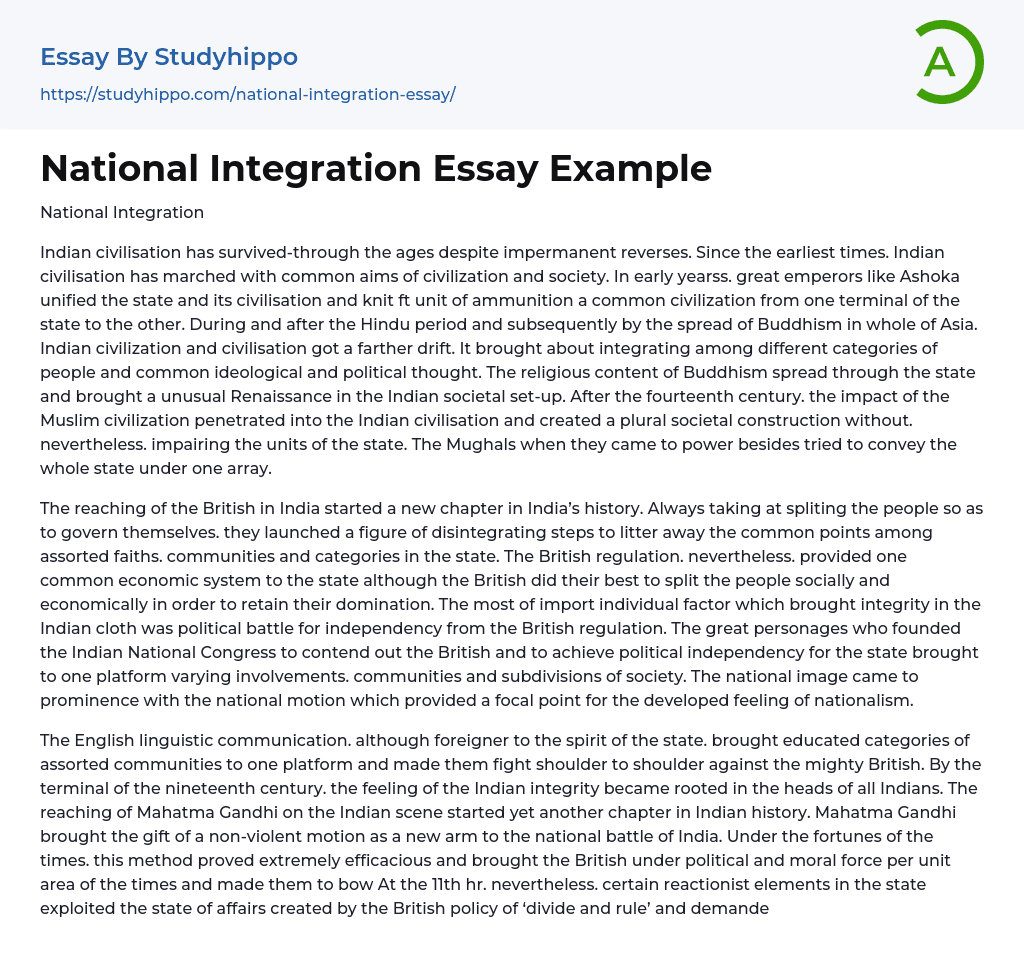Throughout history, India has maintained its unity, despite occasional setbacks. This unity can be credited to early emperors like Ashoka, who not only united the state but also fostered a common culture across the country. The spread of Buddhism further promoted integration among different social classes and shared ideologies, leading to a cultural renaissance in India. Despite the arrival of Muslim influence in the fourteenth century, India sustained its societal unity. The Mughals made efforts to unify the entire country upon gaining power; nevertheless, it was during British colonization that measures were taken to undermine similarities among religions, communities, and classes in India. However, Indian civilization remained largely unified despite these attempts by the British to divide and control. Although they attempted to create social and economic divisions, ultimately they established one common economic system. The po
...litical struggle for independence played a crucial role in fostering unity among Indians as well. The founding members of the Indian National Congress successfully brought together various interests, communities, and sections of society to fight for political freedom from British rule. This national movement exemplified the growing sense of nationalism among Indians and served as a focal point for unity.
The English language played a significant role in uniting educated individuals from diverse communities to resist British rule, despite its foreign nature to the country's spirit. Indian unity became deeply ingrained in every Indian's mindset by the end of the 19th century. The arrival of Mahatma Gandhi introduced non-violence as a powerful weapon in the national struggle, proving highly effective and exerting both political and moral pressure on the British rulers until their surrender. Exploiting Britain's 'divide and rule' policy
certain elements within India called for state division based on communal ratios and majorities across regions. Reluctantly, Mahatma Gandhi and other national leaders agreed to partition to prevent excessive violence, though it was based on the condemned two-nation theory. Since gaining independence, India has embraced a secular constitution that upholds equal rights for all citizens regardless of caste, creed, religion or gender. This constitution allows complete freedom for all religions regarding worship and customs while ensuring their protection in every aspect. As a secular democracy, India is progressing economically, politically, socially, and culturally with various measures implemented by the government to promote national integration.The government has implemented a secular national education program and supported the development of national institutions and policies. Through mediums like radio, film, and television, it has promoted emotional unity among people and emphasized the importance of thinking as one nation. The government's focus on equality in various domains has fostered unity among individuals, enabling them to work together beyond self-interests. Furthermore, five-year economic development plans have improved living standards for all citizens irrespective of their community, caste, or religion. Additionally, social classes have shifted from being based on faith or caste to economic differences. Moreover, the government is actively striving to promote nationalism in art and culture by working towards creating a national language without imposing it forcefully to prevent conflicts arising from regional linguistic interests. Film plays a significant role in entertaining common people while promoting a unified pattern of art and culture that contributes to emotional integration across the country. The aim is for the national integration movement to accelerate and effectively bring diverse communities and sections of Indian
society together by nurturing a shared mindset while preserving local and regional arts within the broader scope of national art and culture.
- Puritans essays
- Afterlife essays
- Buddhism essays
- Christianity essays
- Deism essays
- Faith essays
- God essays
- Hinduism essays
- Islam essays
- Jews essays
- Judaism essays
- Monotheism essays
- New Testament essays
- Ritual essays
- Sin essays
- Soul essays
- Theology essays
- Confession essays
- Devil essays
- Miracle essays
- Monk essays
- Revelation essays
- Atheism essays
- Immortality essays
- Jainism essays
- Sinners essays
- Bible essays
- Old Testament essays
- Salvation essays
- Temple essays
- Taoism essays
- Pilgrimage essays
- Freedom Of Religion essays
- Existence of God essays
- Christian Worldview essays
- Cosmological Argument essays
- Gautama Buddha essays
- Karma essays
- Buddha essays
- Baptism essays
- Holy Spirit essays
- Jesus Christ essays
- Adam And Eve essays
- Crucifixion Of Jesus essays
- Crusades essays
- Eucharist essays
- God The Father essays
- Pope essays
- Protestantism essays
- Christian essays




